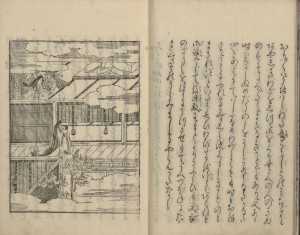
In both Anatomy of Criticism and The Secular Scripture Frye refers to Lady Murasaki’s The Tale of Genji as an example of an “endless” romance, the conclusion of which does not preclude Lady Murasaki from adding any number of additional episodes. Frye annotated his own copy of this expansive eleventh century Japanese tale of court life (trans. Arthur Waley [London: George Allen & Unwin, 1957] 1135 pp.) Frye’s annotations are more expansive than the notes he ordinarily scribbled in the margins of his books. If he were to have written an essay or a more extended commentary on The Tale of Genji, the essential core might well have come from his annotations, which are transcribed in what follows. (The numbers in parentheses following each entry are to the pages in Frye’s edition.)
The title “dwellers above the clouds” indicates that courtiers were thought of, & wished to be thought of, as leading a severe & untroubled life of pleasure & privilege. Murasaki shows them as spoiled, frustrated, and boring each other (with the women often quite literally) to death. Is the brutal selfishness of the men something she accepts as a datum of life, or something she is satirizing? The latter by implication, certainly. (46)
Interesting to know if the original has anything of the Virginia Woolfish quality of the translation. (81)
Genji reminds me of the flower known as the red-hot poker. If I were a Japanese I could make a poem out of that. (108)
When night lets fall her sable hood
How may one know which dame one scrood? (153)
The most startling feature of this wonderful story is the sense of social security—no reference to torture, imprisonment, beatings, violence, executions, or even war. In the court, life is like a modern university: when the emperor gets bored with emperoring he just quits, with no questions or upsets. Murasaki makes it clear that this security extends only to a stratospherically elevated group, but within that group, civilization is complete. (184)
The story is realistic in the sense that nothing supernatural or incredible (in her terms) occurs & in the sense that all human foibles & weaknesses are fully displayed. But there’s another feature that makes it a romance in my sense—or one of my senses. That’s her acceptance, not of her own society only, but of that society’s idealized picture of itself. People who are socially the best people, in other words, really are the best people. The exact degree of a girl’s beauty (except for Kiritsubo) depends primarily on her heredity, like a knight’s chivalry in Malory. (184).
The jealous mistress Rukujo sets up a Ligeia pattern, killing Yugao & Aoi by projecting a part of herself & bewitching them. She even speaks through them just as Ligeia does. After her death she becomes more formidable, a prowling ghoul who seizes on Murasaki. Yugao is a sleeping beauty archetype: the incarnate dream of the perfect mistress discovered in a completely isolated spot. (Not completely isolated: she’d already been discovered by Genji’s brother-in-law, who’d had a child by her, but that doesn’t bother Genji: he just wants to adopt the child. Civilized buggers.) (359) Continue reading →



